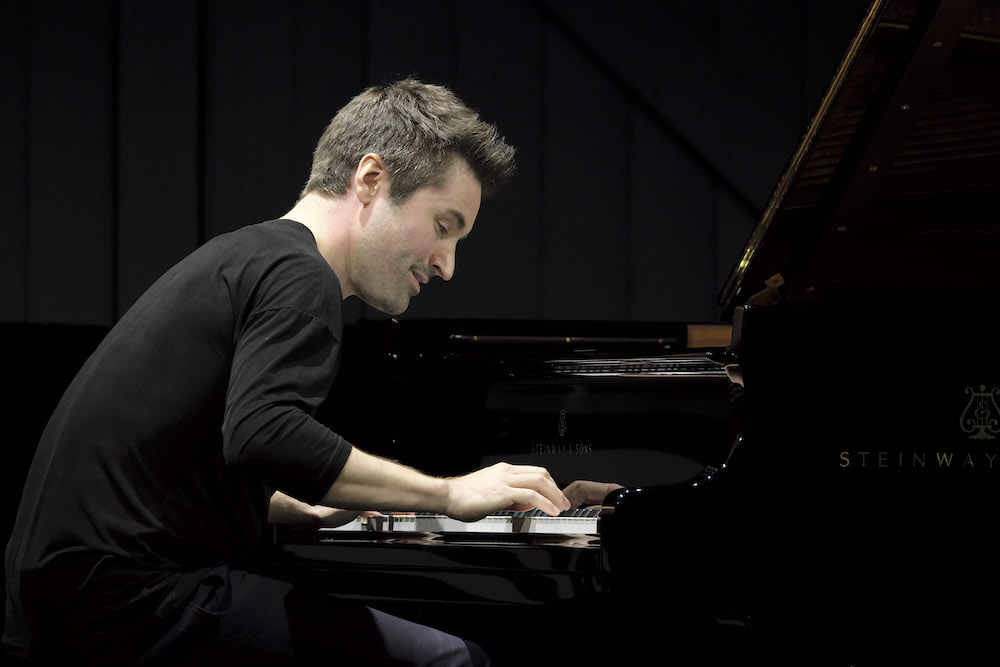As late as in the 21st century there is debate over the origins of JS Bach’s Goldberg Variations, published in 1741. In 1803, more than 50 years after Bach’s death, and more than 60 years after the Goldberg Variations were published, German musician, musicologist and music theorist, Johann Forkel, wrote Bach’s first biography. In it, he related that the work was written for Johann Gottlieb Goldberg. Goldberg was 14 years of age at the time of publication and he was employed by a Russian diplomat, Count Hermann Karl von Keyserling, who visited Leipzig frequently and took Goldberg with him for lessons from Bach.
 Dan Tepfer at the Canberra International Music Festival. Photo © Peter Hislop
Dan Tepfer at the Canberra International Music Festival. Photo © Peter Hislop
Von Keyserling suffered insomnia and would ask Goldberg to play for him to ease the condition. According to Forkel, the Count had asked Bach to write something for Goldberg to play for him that would be “of such a smooth and somewhat lively character that he might be a little cheered up by them in his sleepless nights.” At the same time the work probably was instructional for Goldberg. Some have claimed that Forkel’s conjecture may have been distorted in the intervening years. Others have even prosecuted the notion that Bach may not have written the opening aria, a Sarabande, on whose bass line the 30 variations are founded.
But all of that really is somewhat academic, for the Goldberg Variations stands as one of Bach’s masterpieces and presents a pretty serious challenge for any keyboardist wanting to tackle it. Canadian pianist, Glenn Gould, did, making two recordings – in 1955 and 1981 – both of which, in the modern vernacular, went viral. Later, both recordings were released as a single, much sought-after set.
According to the Washington Post, jazz and classical pianist, Dan Tepfer, born in 1982 in Paris to American parents, “refuses to set himself limits”. Certainly, the Goldberg Variations posed no threat to that philosophy. Not only does Tepfer play the aria and 30 variations but has improvised on them, according to the Wall Street Journal, to “build a bridge across centuries and genres”.
Tepfer has taken the Goldberg Variations and turned them into a study that sees each variation then given a jazz improvisation. In total the performance lasted almost 90 minutes with no break, except a 10- or 15-second pause after the 15th. Such an approach is an extraordinary feat of concentration, much less relating the improvisations to the variations and quite apart from the interpretations given to each of Bach’s pieces – and all of it played from memory.
There was humour in the fourth improv, while the 30th, which Tepfer had nicknamed mashup, was the answer to quodlibet, Bach’s nickname for its partner variation, itself something of a joke. There were sad, melancholy moments and bright, happy ones. Others were thoughtful and still others were exuberant. Of course, in a jazz vein, spontaneity is the key. And perhaps this was the case – or was it purely coincidental – that, when someone’s phone went off, Tepfer mimicked the sound, albeit in a different key!
But all the way through the striking thing was that the improvs proved that Bach’s music is just as relevant today as it was nearly 300 years ago. Even with Tepfer’s very contemporary jazz stylings, the harmonies and structures in each variation and improv were highly complementary, almost seamlessly running one to the other. Tepfer loaded every variation up with emotion and expression, something Bach rarely marked in his manuscripts, which then provided the foundation for the improvisation to follow, giving the two closely-related textures and context. Even so, in the variations, Tepfer would sit motionless at the piano, but would lean into it for the improvs, even adding subconscious vocal embellishments. Through it all, his playing was fluid and smooth.
Tepfer held his audience breathless along its entire length. Even at the end, after the repeated aria, he held the audience silent for what seemed an eternity before it erupted into a thunderous standing ovation. In this performance Tepfer set Bach free, and, in the end, in the aria, Tepfer played with such wonderful sensitivity, he took Bach in his arms for a warm respectful embrace. This was an astonishing performance.











Comments
Log in to join the conversation.